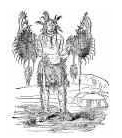
Dirge for a Shaman
THE LIFE & DEATH OF THOMAS BERRY
Thomas Berry died on June 1, 2009, at age 94. A Passionist priest and self-styled “geologian,” he was described by Newsweek in 1989 as “the most provocative figure among the new breed of eco-theologians.” Among the tributes he received after his demise, we find these three: Fr. Diarmuid O’Murchu lauded him as “the single greatest disciple of Teilhard de Chardin” and a “great prophetic figure of our time.” Holy Cross Br. Dave Andrews of Food and Water Watch, a non-governmental organization, declared that Berry gave him a “new view of history, culture and religion.” And Fr. Sean McDonagh praised him as not only “the most important and insightful Catholic commentator on environmental issues during the second half of the 20th century,” but as one who has set “the agenda for every human being for the 21st century.”
Born in Greensboro, North Carolina, in 1914, Thomas Berry joined the Passionists in 1934 and was ordained in 1942. He directed the graduate program in History of Religions at Fordham from 1966 to 1979, the American Teilhard Association from 1975 to 1987, and New York’s Riverdale Center for Religious Research from 1970 to 1995. He was also mentor to the “green sisters.” [To learn more about who they are, see this author’s review of Sarah MacFarland Taylor’s Green Sisters: A Spiritual Ecology in the Feb. 2008 NOR — Ed.] From Vermont’s “Green Mountain Monastery and Father Thomas Berry Sanctuary,” Sr. Gail Worcelo informs us that he chose to be “returned to a beautiful meadow on our land” in a burial on June 8, 2009. Under his guidance, Worcelo, a Passionist nun, started this monastery ten years ago to seek “the refounding of religious life in light of new understandings of the universe story and the evolution of Christ Consciousness.”
Upon examining three of Thomas Berry’s books — The Dream of the Earth (1988), The Great Work: Our Way into the Future (1999), and Evening Thoughts: Reflecting on Earth as Sacred Community (2006) — one finds that, for Berry, ecology is “the supreme subversive science” that has the power to undermine Western culture, the culture he blames for today’s ecological crisis. Mere environmentalism, he asserts, will not solve our problems, so he proposes that ecology become the “foundation of all courses, all programs, all professions.” Not only must the West change its institutions — legal, political, commercial, industrial, educational, religious — from top to bottom, it must “create a new language, even a new sense of what it is to be human,” and find a “completely new sense of reality and of value.”
Fr. Berry admits that what he proposes will revolutionize Western culture — in law, it will become a crime to act as if “natural beings” are only “material realities”; in agriculture, a large part of the population will have to engage in subsistence farming, with each bioregion forced to be self-sustaining; in religion, the natural world will become the “primary scripture”; and in morals, “biocentrism” — placing the interests of human beings on the same level as, or even below, those of rivers, trees, and animals in a given bioregion — will replace the “natural-law vision of the medieval world.” He’s aware that, at first, biocentrism will be hard to take, because we humans will need to learn that the Earth (always with a capital E) is “primary” and we are only “derivative.” We will have to see ourselves as nothing more than a “species among species” and to take the Earth as an “extrahuman referent” for our decisions. According to Berry, there is a “pathology” embedded deep in Western culture, dating from when Judeo-Christianity linked up with Greek humanism, in which religion and the humanities have been guilty of putting human beings above the natural world. Even Western science has treated “the human as Olympian ruler of the planet.” But this view of human nature as “a superior mode of being” is passé, for now our species has become “the affliction of the world, its demonic presence.”
You May Also Enjoy
He refers to God as Mother, encourages homosexual advocacy, denies the spiritual reality of Original Sin, and denies the necessity of the Cross for redemption.
Like the eugenics juggernaut of a century ago, the 'deep ecology' juggernaut presents us with the same evil program: population control.
A "humanitarian" blogger calls the Prayer of the Centurion (Lord, I am not worthy that you should enter under my roof) one of the "most destructive phrases in human history."

